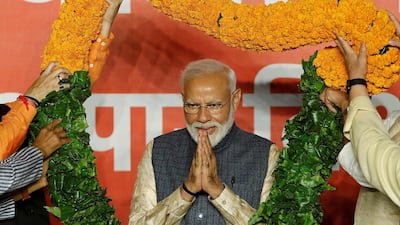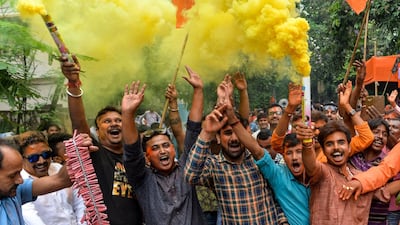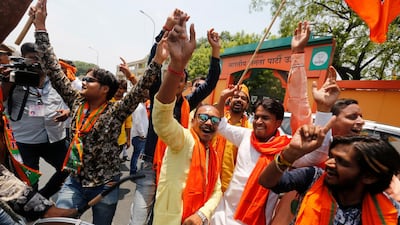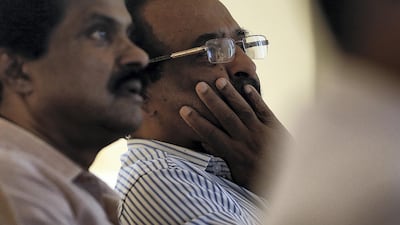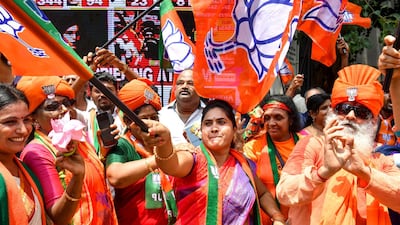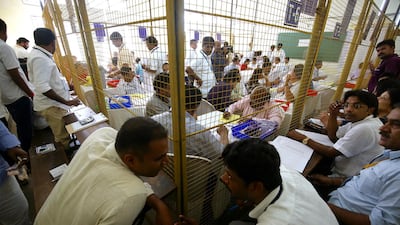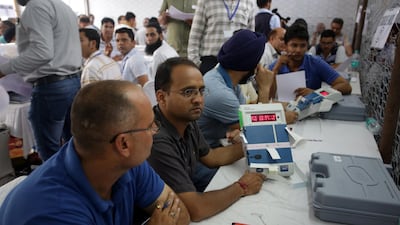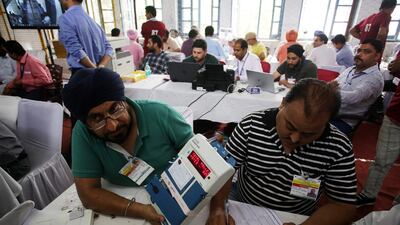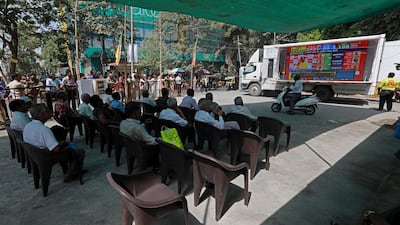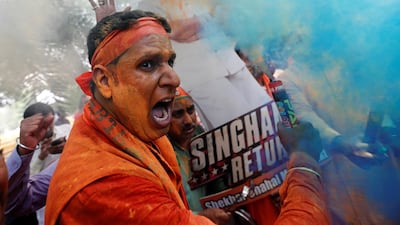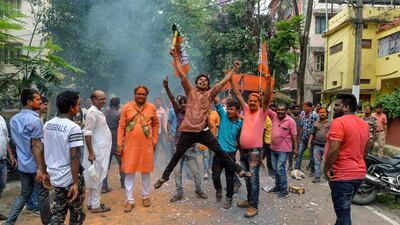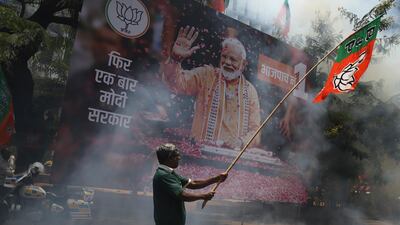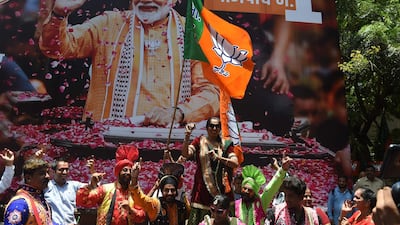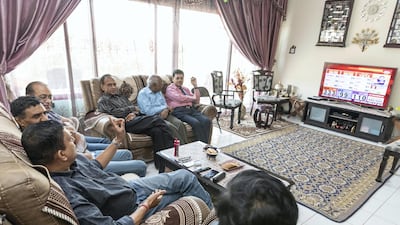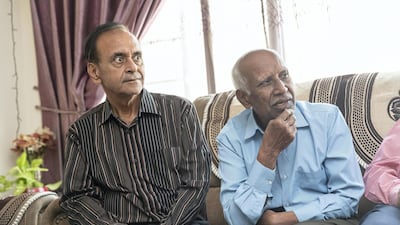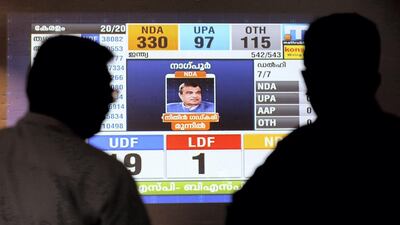Prime Minister Narendra Modi led the Bharatiya Janata Party to a barnstorming victory in India’s general election on Thursday.
As evening fell, crowds of supporters gathered at the party headquarters in Delhi to hail Mr Modi’s success.
The victory margins beat even the most optimistic expectations of BJP analysts in an election that had virtually become a referendum on his leadership.
Vote counting proceeded through the day but the trends became clear early on.
By the afternoon, the BJP was leading in 301 out of 542 constituencies, on track to earn a second successive majority on its own – the first time any Indian party has done so since 1984.
The BJP’s parliamentary strength swells further still with the performances of its allies.
The Congress, its main opposition and India’s oldest political party, barely managed to improve its tally from five years ago.
Having won 44 seats in the Lok Sabha, or the lower house of parliament, in 2014 the Congress on Thursday led in about 50 seats.
Final tallies were expected to be completed and released later in the day.
For months, through campaigns in the winter and spring, the BJP’s rivals had attacked Mr Modi’s government for its economic and social failures. Growth has slowed and jobs are scarce.
Religious tension has sparked violence, mostly from right-wing mobs encouraged by the kind of Hindu nationalism the BJP espouses.
For these reasons, election analysts went into polling season offering tempered prospects for the BJP.
Polling company C Voter predicted the BJP and its partners – the coalition formally called the National Democratic Alliance – would win 261 seats. Another agency, Now-VMR, predicted 283.
But the alliance ended up leading yesterday in more than 340 seats, more than the 336 it won in the last election.
The BJP also looked set to comfortably exceed the 282 seats it won in 2014.
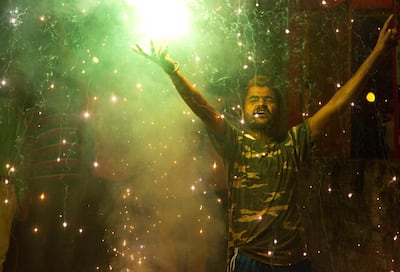
As counting progressed, celebrations started outside the BJP’s headquarters in New Delhi, with party workers dancing, singing and chanting slogans.
Firecrackers sputtered and fizzed. Some supporters wore masks depicting Mr Modi in acknowledgement of the great role the prime minister’s persona played in securing the victory.
"This is not a Modi victory. This is a victory for the hopes of honest people," he said in his victory speech. "This is a victory for those farmers who sweat it out for the country."
Congratulations poured in for Mr Modi from foreign leaders, including Sheikh Mohamed bin Zayed, Crown Prince of Abu Dhabi and Deputy Supreme Commander of the UAE Armed Forces.
“I was pleased to talk to my dear friend Narendra Modi, India’s PM, over the phone to congratulate him on his party’s election win,” Sheikh Mohamed wrote on Twitter.
Other congratulations came from Imran Khan, the Prime Minister of India's arch-rival Pakistan.
Mr Modi had fought his election by promising to be harsh on terror, referring often to the air strike that his government ordered against a claimed terror camp on Pakistani soil.
“I look forward to working with him for peace, progress and prosperity in South Asia,” Mr Khan said.
The map of constituencies across India became suffused with saffron, the colour associated with the BJP.
The party failed to make ground only in some southern states, in Punjab and in the extreme north-east of the country.
The elections were full of individual contests that were surprising or revelatory.
In Amethi, the Uttar Pradesh constituency that has long been a stronghold of the Congress, party president Rahul Gandhi trailed by about 10,000 votes.
By contrast, Mr Modi was winning more votes in his constituency of Varanasi than the rest of his opponents put together – more than half a million compared to about 165,000 for the runner-up.
In East Delhi, former cricketer Gautam Gambhir was running for the BJP in his first-ever election.
Mr Gambhir trounced Atishi Marlena, an Aam Aadmi Party candidate who has earned credit and goodwill for improving the capital’s schools.
In Bhopal, BJP leader Pragya Thakur, who faces trial on charges of terrorism, won her constituency by about 300,000 votes.
In Uttar Pradesh, which fields 80 members of parliament to represent its 200 million residents, the BJP took on an alliance of two large regional parties and flourished.
His alliance was leading in 58 seats. That was not as many as the 71 in 2014, but still a robust performance.
Peer Mohamed, a Chennai political analyst, said it was possible to see a turn of events through the campaign season.
Mr Mohamed said that in December and January, "the discussions were about jobs, unemployment and the forming agrarian crisis".
He said the BJP shifted the focus to national security, especially after a terror attack in Kashmir and the retaliatory air strike against Pakistan.
"Then it became about a different emotion," Mr Mohamed said. "When the talk was about jobs, people reacted with anger.
"But when Modi talked about security and said that he was the only one who could keep India secure, people felt self-respect and national pride."
The election casts the future of the Congress party and its system of leadership in grave doubt. The party, once used to governing India term after term, has now been defeated in two successive elections.
Mr Gandhi’s presidency of the Congress has suffered a severe blow.
He is the fifth generation in his family to be the party’s chief, and questions will be raised as to whether this dynastic mode of leadership is hobbling the Congress.
Yogendra Yadav, the president of the small new Swaraj India party, has called for the Congress to die.
The party is an obstacle "to those who want to build an alternative", Mr Yadav wrote in the Indian Express newspaper on Tuesday.
He said it sucked up political energy without being able to use it to defeat the BJP.
“It won’t do the job and won’t let anyone else do it,” Mr Yadav said.
In a brief appearance, Mr Gandhi did not reveal any thoughts about the future of his party, or any decisions about the way forward.
“A new prime minister has been elected, and today is the day to wish him all the best," he said. "Hopefully he will look after the interests of the country.”
